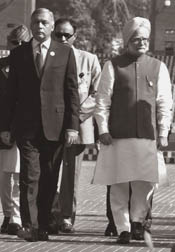|
DAILY NEWS ONLINE |
|
|
|
OTHER EDITIONS |
|
|
|
|
|
|
|
|
|
OTHER LINKS |
|
|
|
|
|
|
  |
|
|
|
|
Although no spectacular progress has been reported so far in the Indo-Pakistani peace process, the fact that bilateral, informal talks have been held between the Indian and Pakistani Prime Ministers on the sidelines of the recently-concluded 13th SAARC Heads of State Summit in Dhaka, holds out the possibility of the SAARC process continuing into the foreseeable future minus any major interruptions.
Although reports said that no fresh proposals were made by the two sides for boosting the Indo-Pakistani peace process the fact that Indian Prime Minister Manmohan Singh had taken up the position during the talks that the peace process should "not be deflected by the kind of terrorist incidents which continue to take place," is particularly significant from the point of view of improving Indo-Pakistani ties as well as sustaining the SAARC process.
The "terrorist incidents" referred to by the Indian Premier are apparently of the kind which caused a huge carnage recently in New Delhi, incurring over 50 deaths. Although no concrete evidence has emerged so far, the bomb blasts in question are believed by some sections in India to be the bloody handiwork of Kashmiri separatists.
Accordingly, "cross border terrorism" is continuing to cast a shadow over Indo-Pakistani relations and the future of Indo-Pakistani ties as well as that of SAARC could be said to be positively-oriented as long as India and Pakistan peacefully resolve this thorny issue which has time and again proved a stumbling block to regional progress in the past.
As has been pointed out in this column in the past, "cross border terrorism" in this region could not be studied in isolation from current, global political polarities, one of which has won for itself the label "Clash of Civilizations."
The bloody rebellion in the Indian-ruled half of Kashmir cannot be de-linked from the anti-Western, insurrectionist violence, for instance, in Iraq and Afghanistan and terror onslaughts targeting Western interests in Egypt, Indonesia and more recently Jordan. The rebellion in Kashmir, therefore, is part of a chain of mainly religion-based violence extending from the Mediterranean and Caspian Sea regions, across the Middle-East, West and South Asia to South-East Asia.
Jointly combating terrorism features as an important collaborative venture among SAARC states in the joint declaration issued by SAARC political heads at the end of the 13th summit. It is important to note that the SAARC convention on the suppression of terror has now been strengthened by an additional protocol.
While the taking of innocent lives for whatever reason has to be condemned as terroristic, it needs to be recognized that such despicable acts have received a fillip from ideologies that preach racial and religious intolerance. Such ideologies have won currency among groups which are subjected to military repression and cultural oppression but this is no justification for the unleashing of terror.
In these circumstances, the best that SAARC could do is delink itself from the US-led "war on terror" and commit itself explicitly to values such as ethnic and religious tolerance, democratic accommodation and the peaceful resolution of disputes. Hopefully, SAARC conventions on these lines would be ratified at State level and vigorously implemented.
Such policy initiatives could go some distance in blunting the appeal of extremist ideologies which are currently finding fertile soil among impressionable groups in the region. SAARC has, correctly, committed itself to implementing SAFTA in the near future and moving vigorously forward on the poverty-alleviation path, but SAARC amity is a precondition for the effective fulfilment of such projects.
Commonly-shared humane values are, in turn, the essential basis for the establishment of regional amity in general and Indo-Pakistani friendly ties in particular, on which SAARC progress considerably depends. Battling extremism and intolerance of various species, therefore, emerges as a prime SAARC challenge.
|
|


